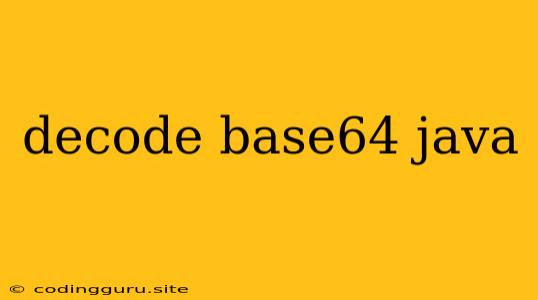Decoding Base64 in Java
Base64 is a popular encoding scheme used to represent binary data in an ASCII string format. This is useful for transferring data across different platforms or networks that might not support binary data directly. Java provides built-in functionalities to decode Base64 encoded strings.
Let's explore how to decode Base64 in Java.
Why Decode Base64?
When you receive data encoded in Base64, you need to decode it back to its original binary format. This is often necessary for:
- Reading and processing images: Images are often encoded in Base64 for easier storage and transfer.
- Handling encrypted data: Encryption techniques sometimes involve encoding the encrypted data in Base64.
- Working with JSON or XML data: Base64 encoding can be used within JSON or XML structures to represent binary data.
How to Decode Base64 in Java
Java offers two primary approaches to decoding Base64 strings:
1. Using Base64.getDecoder().decode(String)
This approach leverages the built-in Base64 class from the java.util package. It's a simple and efficient method.
Example:
import java.util.Base64;
public class Base64Decoder {
public static void main(String[] args) {
String encodedString = "SGVsbG8sIHdvcmxkIQ==";
byte[] decodedBytes = Base64.getDecoder().decode(encodedString);
String decodedString = new String(decodedBytes);
System.out.println("Decoded string: " + decodedString);
}
}
Output:
Decoded string: Hello, world!
2. Using Apache Commons Codec
The Apache Commons Codec library provides a comprehensive set of encoding and decoding utilities, including Base64.
Example:
import org.apache.commons.codec.binary.Base64;
public class Base64Decoder {
public static void main(String[] args) {
String encodedString = "SGVsbG8sIHdvcmxkIQ==";
byte[] decodedBytes = Base64.decodeBase64(encodedString.getBytes());
String decodedString = new String(decodedBytes);
System.out.println("Decoded string: " + decodedString);
}
}
Output:
Decoded string: Hello, world!
Explanation:
Base64.getDecoder().decode(String): This method takes a Base64 encoded string as input and returns the decoded bytes.Base64.decodeBase64(String): This method from the Apache Commons Codec library takes a Base64 encoded string as input and returns the decoded bytes.new String(decodedBytes): This converts the decoded byte array into a String.
Handling Potential Issues
When decoding Base64, you might encounter situations where the input is invalid.
- Invalid Base64 Encoding: If the input string contains invalid characters or is not a valid Base64 string, you will get an exception.
- Invalid Base64 Padding: Base64 encoding sometimes uses padding characters (
=). If the padding is missing or incorrect, you might face decoding errors.
To prevent these issues:
- Use
Base64.getDecoder().decode(String): This method automatically handles padding and throws anIllegalArgumentExceptionif the input is invalid. - Use
Base64.decodeBase64(byte[], boolean): In Apache Commons Codec, thebooleanparameter allows you to specify if you expect padding (true) or not (false). This gives you more control over the decoding process.
Example with File Input
Let's see an example of decoding Base64 encoded data from a file.
import java.io.BufferedReader;
import java.io.FileReader;
import java.io.IOException;
import java.util.Base64;
public class DecodeBase64FromFile {
public static void main(String[] args) {
try (BufferedReader reader = new BufferedReader(new FileReader("encoded_data.txt"))) {
String line;
while ((line = reader.readLine()) != null) {
byte[] decodedBytes = Base64.getDecoder().decode(line);
System.out.println("Decoded bytes: " + new String(decodedBytes));
}
} catch (IOException e) {
System.err.println("Error reading file: " + e.getMessage());
}
}
}
This example reads a file named encoded_data.txt containing Base64 encoded data, decodes each line, and prints the decoded output.
Conclusion
Decoding Base64 in Java is a straightforward process. The built-in Base64 class provides a simple and efficient way to decode strings. If you need additional functionalities, consider using Apache Commons Codec. Remember to handle potential issues like invalid encoding and padding to ensure your code is robust.
